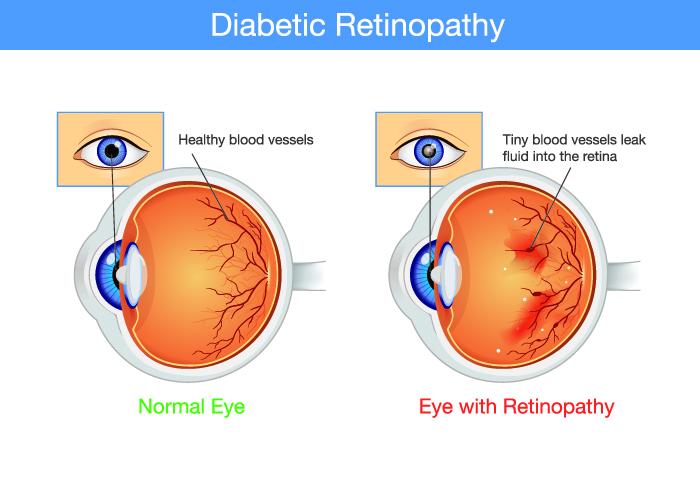Diabetic Retinopathy Treatment in Sadashiv Peth, Pune
Intro
Diabetic retinopathy is a condition that damages the blood vessels of light-sensitive tissue present in the retina. It can develop in anyone with type 1 or type 2 diabetes. If you have less controlled blood sugar, you are more likely to develop this complication. At first, it doesn’t cause any symptoms. It starts with mild vision problems and can eventually lead to blindness. In simple terms, it is a complication associated with diabetes that affects the eyes.

Types/Classification
There are two types of diabetic retinopathy:
- Nonproliferative - This is the early stage of diabetic retinopathy in which small retinal blood vessels start breaking and leaking.
- Proliferative - In this, the blood vessels start to grow abnormally inside the retina leading to retinal detachment, scarring, and vision loss. These new blood vessels might also bleed or grow into the vitreous humor.
Symptoms
In the early stages of this condition, you might not experience any symptoms. However, as the condition progresses, here are a few symptoms that you might experience:
- Blurred vision
- Fluctuating vision
- Vision loss
- Empty or dark areas in the vision
- Dark strings or spots flowing in the vision
Causes
If you have a lot of sugar in the blood, it can block the small blood vessels responsible for nourishing the retina. This cuts off its blood supply. When this happens, the eye tries to grow new blood vessels. But these don’t develop properly and might leak leading to diabetic retinopathy.
When to see a doctor
The best way of preventing vision loss caused by diabetic retinopathy is through managing your diabetes carefully. If you have diabetes, you should have a yearly eye exam with your eye doctor to check if your vision is fine or not. When you are pregnant and develop gestational diabetes, it increases the risk of diabetic retinopathy. That is why additional eye exams are recommended throughout the pregnancy. If your vision suddenly becomes blurry, hazy, or spotty, you should see a doctor.
Request an appointment at Apollo Spectra Hospitals, Pune
Call 1860-500-2244 to book an appointment
Risk factors
Anyone with diabetes is at risk of developing diabetic retinopathy. This risk increases in the following cases:
- Having diabetes for a long period
- High cholesterol
- High blood pressure
- Tobacco use
- Pregnancy
- Poor control of blood sugar level
Complications
When you have diabetic retinopathy, you have abnormal blood vessels growing in your retina which can lead to the following complications:
- Vitreous hemorrhage
- Retinal detachment
- Glaucoma
- Blindness
Prevention of disease
It is not always possible to prevent diabetic retinopathy. But, with good blood sugar control, regular exams, and early intervention, you can prevent severe vision loss. Here are some tips that will help you do the same:
- Manage your diabetes
- Monitor your blood sugar level
- Keep your cholesterol and blood pressure under control
- Quit smoking or using any other type of tobacco
- Pay attention to any changes in your vision
Treatment
The treatment of diabetic retinopathy depends on the type of diabetic retinopathy you have and its severity.
In the case of early diabetic retinopathy, you might not need immediate treatment. But, your doctor will monitor your eyes closely to determine the exact time when you have to start treatment.
In the case of advanced diabetic retinopathy, you will have to get prompt treatment. Here are some options to choose from depending on the specific problem you might have:
- Injecting medications - Known as the vascular endothelial growth factor inhibitors, these medications are injected into your eye’s vitreous to stop the growth of new blood vessels and reduce fluid buildup.
- Photocoagulation - This is a laser treatment that slows or stops the fluid and blood leakage in the eye.
- Panretinal photocoagulation - In this laser treatment, the abnormal blood vessels are shrunk.
- Vitrectomy - In this, a tiny incision is made in your eye for removing blood and scar tissue tugging on the retina.
It is important to note that these treatments can only slow down the progression of diabetic retinopathy. They cannot cure it. Since diabetes is a lifelong condition, you might have vision loss or retinal damage in the future.
Conclusion
Even after you have received the treatment, you will have to go for regular eye exams. It is possible that at some point in the future, you might have to get additional treatment.
No, it is not possible to cure diabetic retinopathy. With early treatment, you can slow down its progression, but there is no way to reverse the vision loss.
Yes, you can lose your vision even if you have mild diabetic retinopathy. In the case of mild diabetic retinopathy, only small blood vessels are affected. But, there are still at the center of the retina. Any fluid leakage can result in diabetic macular edema as well as vision loss.
Yes, because the damage to the retina that is induced by diabetes develops years after the onset of the condition. So, a complication like macular edema and vision loss might coincide with a period where your diabetes is well under control.
Symptoms
Our Doctors
DR. VANDANA KULKARNI
MBBS, MS, DOMS...
| Experience | : | 39 Yeras Experience |
|---|---|---|
| Speciality | : | Ophthalmology... | Location | : | Sadashiv Peth |
| Timings | : | Available on prior a... |
Our Top Specialities
NOTICE BOARD
CONTACT US
CONTACT US
 Book Appointment
Book Appointment



.svg)
.svg)
.svg)
.svg)








